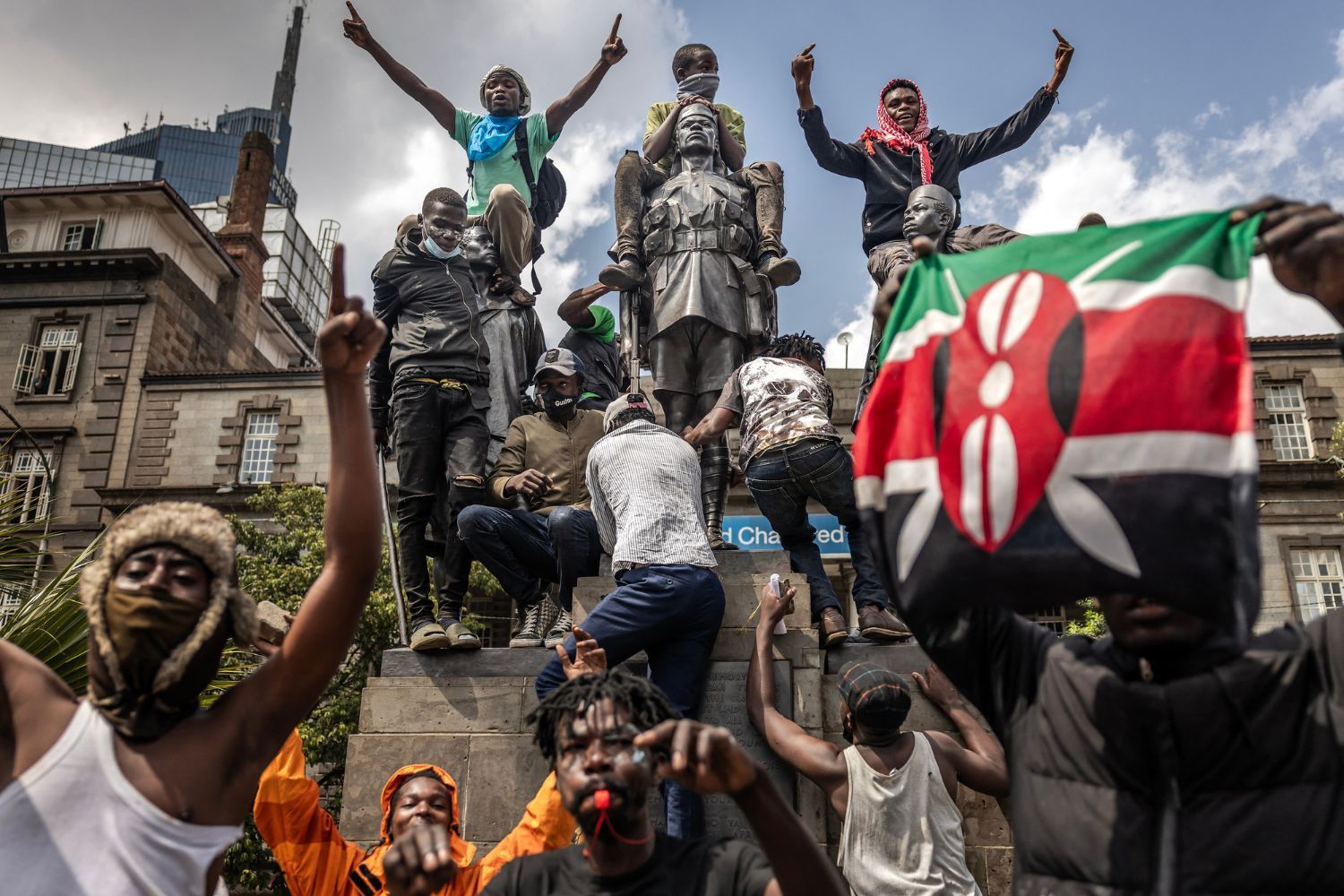A Year Later, Kenya’s Youth Are Still Protesting
As thousands return to the streets on the anniversary of the anti-government demonstrations, Gen Zs reflect on last year’s movement and what remains unresolved.
Thousands of Kenyans took to the streets today, one year after protesters stormed Parliament in a dramatic climax to the 2024 anti-government demonstrations. What began as resistance to a controversial Finance Bill quickly evolved into a national reckoning with corruption and inequality.
While protesters waved flags and held posters with the faces of those killed last year, chants of "Ruto must go" echoed across Nairobi. Police sealed off roads into the city center, and government buildings — including Parliament, State House, police stations, and courts — were barricaded with razor wire. Although the Communications Authority officially banned live coverage, broadcasters shifted to streaming events online via YouTube.
On the first anniversary of what many now call the real Madaraka Day — a reimagining of Kenya's traditional Independence Day that centers the struggles of ordinary citizens rather than the political elite — OkayAfrica revisits the youth who spoke to us during last year's protests to reflect on what, if anything, has changed. For many, the answer is clear: very little.
While it was anti-tax sentiment that first drew them into the streets in 2024, this year, many march again in response to growing police brutality, abductions, and extrajudicial killings, alongside worsening financial hardship and deep public disillusionment.
What is clear among all of them is a deep sense of betrayal by the state. "It's disheartening and almost tragic," says Shawn Dalmas, whose viral TikTok last year called for a Gen Z political party. "We are marking an anniversary of resistance, yet still entrenched in the very crisis that we've been trying to fight," he tells OkayAfrica.
"Last year, we were resisting economic injustice, which was symbolized by the Finance Bill 2024. This year, we are mourning victims of state violence and police brutality [that is] emblematic of a deeper systemic rot from the very core."
Though initially thrust into the spotlight, Dalmas has since stepped back from public organizing after facing intense online backlash and threats. Still, he says that there is a pressing need to move from critique to action. He believes that the fragmentation of vision has hindered the movement beyond protests.
"We cannot shout about bad governance without offering a systematic alternative. You'll keep shouting it's wrong, but what are you offering?"
However, while Dalmas reflects on the need for strategy, others say that this anniversary is a reminder of what was lost. Over 60 people were murdered last year during the protests. That disillusionment resonates with comedian and satiristJustine Wanda, who used her platform "Fake Woke With Justine" as a source of information in 2024.
"This anniversary is personal," she tells OkayAfrica. "Any person killed by the state could be me. It could be anyone I know. We are commemorating the comrades we lost. But we're also ensuring that their deaths are not in vain. They're never forgotten. They were fighting for the right thing. We were all fighting for the right thing."
What hurts most, she says, is the government's gaslighting of young people and the absence of genuine change. "They just changed faces in government posts, but it's the same circus. It's the same clowns, different outfits."
Kevin Bett, an entrepreneur who helped launch a crowdsourced embezzlement tracker last year, has spent the past twelve months expanding that platform. He represents the techies from Africa's Silicon Savannah who used their skill sets to support the movement.
Since we last spoke to him, the embezzlement tracker has evolved into a comprehensive website that maps stolen funds and stalled projects by location. "We even built a tracker for every major scandal since independence," he tells OkayAfrica.
Bett says that the continued cover-ups and abductions, including of people he has worked with, have only deepened his resolve. "Every time I think about the over 60 people who died last year, it fuels me to keep going," he says.
Since last year's protests, many speak of a political awakening among young Kenyans, especially Gen Z, who have become the face and engine of resistance. "It was the first time in our history where Gen Z took center stage in shaping national discourse," says Dalmas. "I've never seen something like it, and no one has ever seen anything like it."
Wanda agrees. "The political class has shown a lot of young people the middle finger. So they're just figuring out how to defend the integrity of their dreams and their asks from the government."
Still, their outlook is tempered with realism. "Institutionally, nothing has changed," Dalmas admits. "But mentally, we're not where we were a year ago."
Bett echoes that cautiously optimistic tone, "It might look as if we've taken two steps back. But in hindsight, I believe we are ahead in terms of the trajectory we want to follow as a nation. So I'm really optimistic because change starts from the mind."
- Why Kenyans Have Remained on the Streets in Protest ›
- How Kendrick Lamar is Soundtracking Kenya’s Anti-Finance Bill Protests ›
- Kenyan Parliament Passes Controversial Finance Bill as Protests Turn Deadly ›
- In Kenya, Protesters Push for Women's Right to Life ›
- Protests Against Cost of Living Turn Deadly in Kenya; Opposition Vows to Continue Demonstrations ›
- Fueled by Protests, Kenyan Developers Innovate Tech to Support Movement ›
- Kenya’s Youth Lead the Charge for Change: “It’s a Gen Z Spring!” ›
- Africa Update: June 26 - Kenya Minister Protests Coup Attempts, 29 Die in CAR Stampede, South Sudanese Star Drafted NBA | OkayAfrica ›
- Op-Ed: Faith Kipyegon and the Power of Protest in Kenya | OkayAfrica ›
